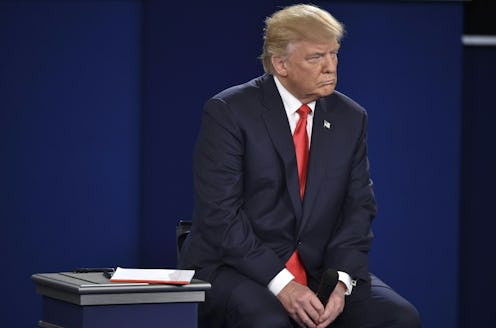News
Trump’s Treatment of Accusers Is Sadly Typical
The past few days have seen a surge of sexual assault allegations against the Republican presidential candidate, Donald Trump. On Thursday morning, Trump responded to some of the accusations, and unsurprisingly, his response was evasive and weak. It's even less surprising, though, not just that it's coming from Trump; he's dismissive and interrogating tone is par for the course when it comes to people coming forward with sexual assault.
We saw the flat-out denial on Sunday. During the second presidential debate, Trump claimed he has never sexually assaulted women and claimed once again that his comments in the 2005 Access Hollywood tape were just "locker room talk," despite the fact that in the tape Trump said, "I just kiss. I don’t even wait. And when you’re a star they let you do it. You can do anything."
After his blatant statements of denial at the debate, two women, Jessica Leeds and Rachel Crook, came forward to the New York Times with stories of Trump touching them inappropriately. The report revealed that when Trump was contacted for a phone interview on Tuesday evening, he claimed none of it ever took place and went so far as to tell the reporter, "You are a disgusting human being."
To add to the sadly growing list, on Wednesday, an article published in the Palm Beach Post shared the story of Mindy McGillivray who also detailed inappropriate touching at the hands of Trump. Later on Wednesday a fourth woman, People magazine writer Natasha Stoynoff shared a story of Trump attempting to force himself on her during an interview back in 2005.
Perhaps what is most telling, however, is Trump's response to the allegations on Twitter Thursday morning. His only rebuttal is that Stoynoff, the writer of the People article, didn't mention her assault in the article 12 years ago.
He also went on to say that The New York Times article was phony, without giving himself any alibis or concrete reasoning for its falsehood.
While it's hardly surprising that Trump himself would ask why the women didn't come forward sooner, sadly this attitude is reflective of the widespread cultural attitudes towards survivors of sexual assault, particularly when the accused are powerful men. When women came forward with stories of being assaulted by Bill Cosby the cultural conversation quickly shifted to asking why the women waited so long, despite the fact that several women had come forward years earlier and ultimately were silenced until news outlets covered the stream of victims.
Similarly, when the porn star James Deen was accused of rape by multuple women, people asked why they waited years to come forward.
There are many personal reasons for women to wait years to come forward (or never come forward at all), RAINN statistics show that 97 out of 100 rapists won't get prosecuted, while studies conducted by the National Violence Against Women Prevention Research Center reveal that at least 11 percent of rape victims suffer from PTSD. Sadly, this isn't even tackling the wide-spread attitudes of doubt and victim blaming towards rape victims. So, rather than asking why Trump's accusers are coming forward now, and not sooner, perhaps a better question to ask is, how do we become better at listening when people do decide to come forward. Perhaps, given the normalcy of backlash, safety in number is the only way to go.
